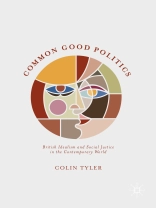This book examines the British tradition of common good politics, both historically and in the contemporary world. We live in a time when many anti-Conservative parties and voters feel a profound sense of crisis and disorientation over political principles and policy directions. As a result, many people are turning to common good politics as an alternative to state-centred socialism and laissez-faire individualism. Colin Tyler explores the practical and intellectual history of the British idealist tradition, which flourished from the 1870s to the 1920s, before applying the principles of common good politics to contemporary issues. These issues include the positive roles that can be played by conflict within democratic societies, the radical demands of social justice in a diverse world, the continuing influence of Bush’s ‘war on terror’, international society and free speech under Tony Blair and David Cameron, and the relationships between economic migration, social justice and the common good. The book will appeal particularly to students and scholars interested in British politics, internationalism and political theory.
Tabela de Conteúdo
Introduction: “British idealism and contemporary common good politics”.- Part 1: British idealism and common good politics.- Chapter One: “The Liberal Hegelianism of Edward Caird: Or, how to transcend the social economics of Kant and the romantics”.- Chapter Two: “Contesting the Common Good: T.H. Green and contemporary republicanism”.- Chapter Three: “‘This Dangerous Drug of Violence’: Making sense of Bernard Bosanquet’s common good theory of punishment”.- Chapter Four: “A Lost World or a New Hope? J.A. Hobson’s New Liberalism and the ‘organic conception of world-politics”.- Part 2: Contemporary issues in common good politics.- Chapter Five: “Power, Alienation and Community in Capitalist Societies”.- Chapter Six: “Social Justice and International Society: Principles for rethinking the international institutional architecture”.- Chapter Seven: “‘History’s Actors’? The ‘war on terror’ and George W. Bush’s attacks on international society”.- Chapter Eight: “Blair’s Legacy: Internationalcommunity, domestic security and the continuing erosion of civil rights”.- Chapter Nine: “Economic Migration, Social Justice and the Common Good: A public lecture”.
Sobre o autor
Colin Tyler is Professor of Social and Political Thought and Director of the Centre for Idealism and the New Liberalism, Hull University, UK. He has published over fifty works and taught at universities in Italy, Japan, Poland, the UK and the US. Colin is a Fellow of the Royal Historical Society and edits
The International Journal of Social Economics.












